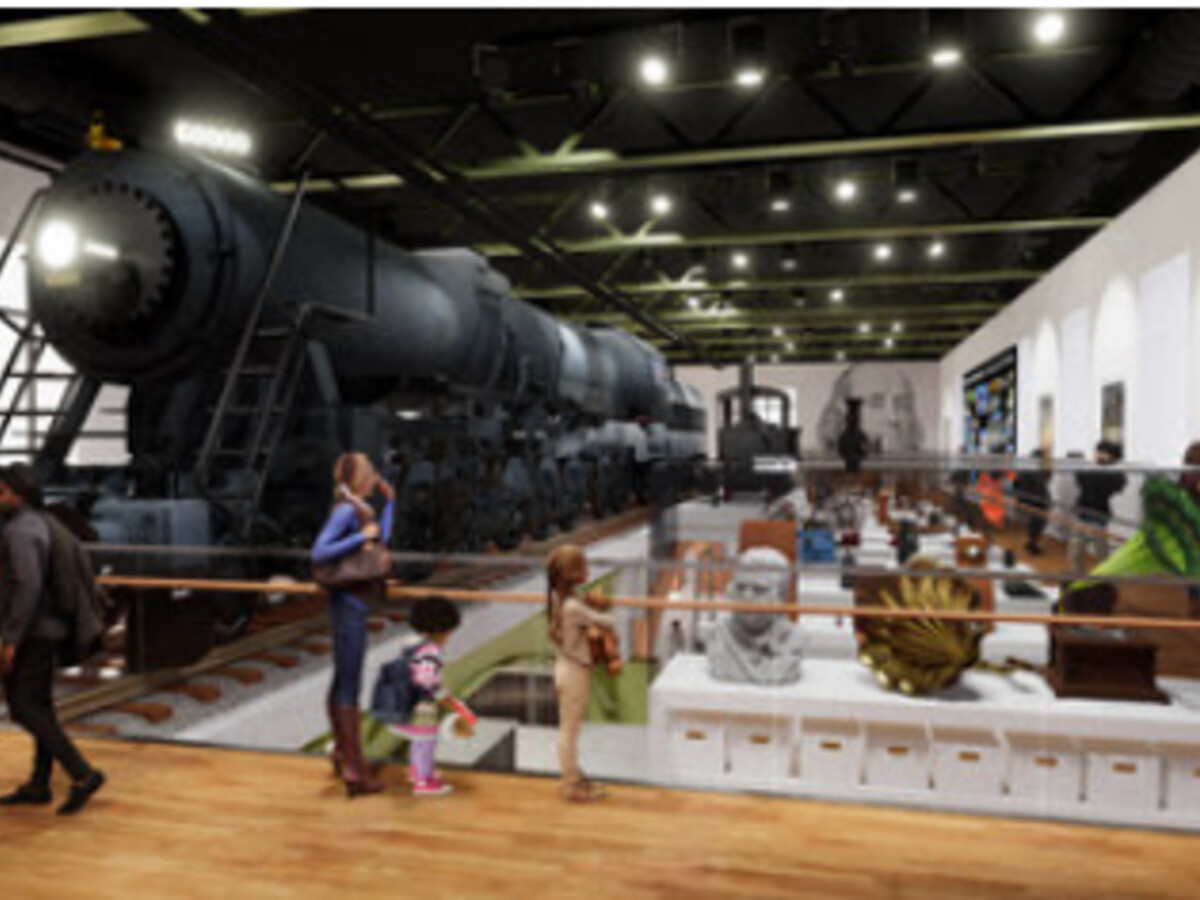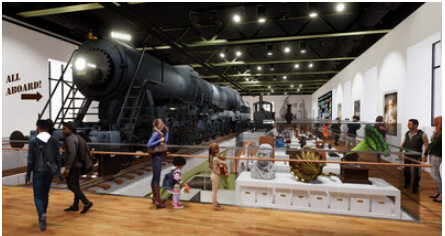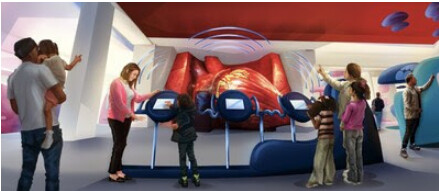Image



As part of its bicentennial celebration, The Franklin Institute, one of the nation's premier science museums and a national leader in science education, is set to unveil two new exhibits around its most celebrated artifacts: the Baldwin Locomotive and the Giant Heart. Opening to the public on Saturday, November 23, 2024, Hamilton Collections Gallery and Body Odyssey represent a major milestone in the museum's multi-year transformation, setting the stage for a new era of exploration and discovery as it enters its third century.
"As we celebrate The Franklin Institute's bicentennial year, unveiling these iconic exhibits marks an exciting chapter in our history. With the Hamilton Collections Gallery and Body Odyssey, we're not just showcasing our two most celebrated artifacts but reimagining the exhibits surrounding them," said Larry Dubinski, President and CEO of The Franklin Institute. "Body Odyssey is a state-of-the-art exhibit on the human body with immersive experiences that not only educate but also inspire, while the Hamilton Collections Gallery offers unprecedented access to hundreds of artifacts from our storied collections, showcasing the rich history of innovation and discovery at the museum."
Hamilton Collections Gallery
A magnificent two-story showcase of the museum's vast collections, curated for public view on a scale never before seen in its 200-year history. At the heart of the $12 million gallery is the Baldwin 60000 Locomotive, a cornerstone of its collections since 1933, now overlooking hundreds of historically significant artifacts spanning two centuries of science and technology breakthroughs, including Benjamin Franklin's Glass Armonica and Lightning Rod, the Light Bulb and other inventions by Thomas Edison, and wing models from the Wright Brothers Aeronautic Collection.

Designed by the award-winning architectural firm SmithGroup, the innovative two-story gallery integrates storytelling with interactive elements to bring the museum's artifacts to life. It also offers guests a rare glimpse into the inner workings of a museum collections center, providing a unique insight into how these historical objects are preserved.
The gallery unveiling will reveal the Baldwin atop a modern architectural design—a cutaway floor with a two-story storage system rising from the foundation level, equipped to showcase thousands of artifacts now visible to the public for the first time. The cutaway provides an overhead view of the five original steel and concrete bridge structures supporting the 350-ton locomotive, a striking example of 19th-century engineering, now fully visible for the first time in decades. The gallery overlooks a collections studio, offering opportunities for researchers and advancing the museum's digitization efforts to make its collections accessible to a global audience.
Inaugural Exhibit: 200 Stories for 200 Years
The Hamilton Collections Gallery's inaugural exhibit, 200 Stories for 200 Years, showcases a curated selection of the museum's vast collections, offering interactive elements that reveal unexpected connections between objects from diverse scientific fields. Artifacts such as the Weigel Celestial Globe, Franklin's Printing Press, and Wax Cylinder Records are brought to life through immersive storytelling, weaving together narratives that capture the pioneering spirit of The Franklin Institute and its namesake as the museum celebrates its 200th anniversary.
The gallery marks a significant milestone in the museum's long history of support from four generations of the Hamilton family, beginning with Samuel M. Vauclain's donation of the Baldwin Locomotive in 1933—now a Philadelphia landmark. In 2017, a $6 million gift from The Hamilton Family Charitable Trust made the gallery possible, and additional support received during the project brought the total contribution to $8.1 million.
Body Odyssey
Curiosity meets discovery in an imaginative new $8.5 million exhibit, Body Odyssey, featuring the iconic Giant Heart. The exhibit is a fascinating journey through the intricacies of the human body in a quest to achieve balance in life and well-being. The 8500-square-foot exhibit features larger-than-life installations, ultramodern simulations, and transportive experiences designed for collaboration and synchronization across three distinct areas: biological systems, biotech innovation, and personal health. Guests will explore the body's network of structure and function, discover actionable ways to promote mental and physical health, and learn, hands-on, how cutting-edge technologies in AI, robotic surgery, and wearable tech—as well as rising industry leaders—are shaping the future of healthcare.
Body Odyssey and the Giant Heart
Originally beating as "The Engine of Life" in 1954, the papier-mâché sculpture was giant enough to walk through, 15,000 times larger than a real heart, enhanced with the sound of a beating heart, and beloved by millions. Now in its 70th year, the Giant Heart is the centerpiece of this comprehensive exploration of health and the human body, and, in an immersive new addition, generations old and new can experience their own heartbeat pulsing from the Heart in a stunning new display of light and sound, energized through movement and synchronization with others.
The award-winning experiential design firm MDSX spearheaded the exhibit, with direction from Abby Bysshe, TFI's Chief Experience and Strategy Officer, and Jayatri Das, Ph.D., TFI's Chief Bioscientist and Director of Science Content. The experience was shaped by input from an expert advisory board and insight gathered from student workshops, which guided the focus toward mental health, the future of the human body, and the interconnectedness of its systems.
Body Odyssey joins the multi-award-winning Wondrous Space as the first two of six all-new exhibits of a multi-year master plan. This ambitious vision encompasses upcoming new exhibits on earth systems, advanced machines and robotics, the built environment, and computer science. All aim to create a holistic and engaging educational experience for guests, and together, they will set the stage for the new Franklin Institute experience.
The Morel Family Foundation is the Lead Supporter of Body Odyssey, with additional support from Mrs. Sandra K. Baldino, Tobey and Mark Dichter, Independence Blue Cross, Marvin Samson Foundation, and Merck Foundation.
The Franklin Institute received funding from the Pennsylvania Tourism Office, housed within the Department of Community and Economic Development, to promote the Hamilton Collections Gallery and Body Odyssey exhibits. Additionally, through the Redevelopment Assistant Capital Program, financial assistance has been provided by the Commonwealth of Pennsylvania, Honorable Josh Shapiro, Governor.
Conservation of the Baldwin Locomotive is by the Heritage Conservation Collective. Daniel J. Keating is the general contractor for the transformation of the Hamilton Collections Gallery, and Becker & Frondorf is the project manager.
About The Franklin Institute
Located in the heart of Philadelphia, the Franklin Institute is a renowned and innovative leader in science and technology learning and a dynamic center of exploration. As Pennsylvania's most visited museum, it is dedicated to creating a passion for learning about science by offering access to hands-on science education. For more information, visit www.fi.edu.
SOURCE The Franklin Institute